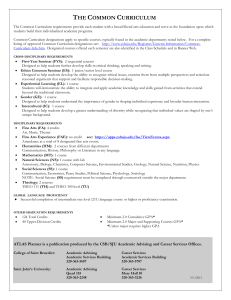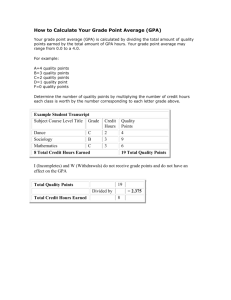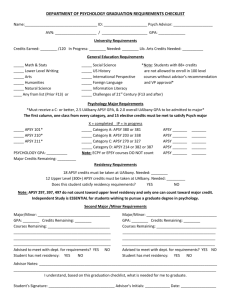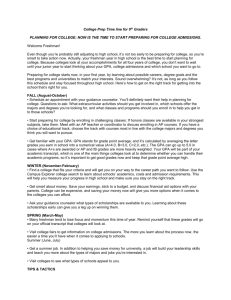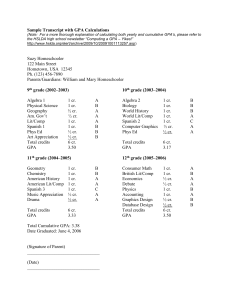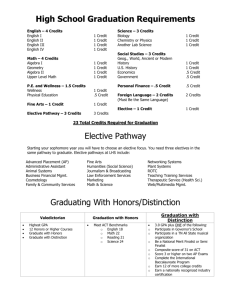Purpose
advertisement
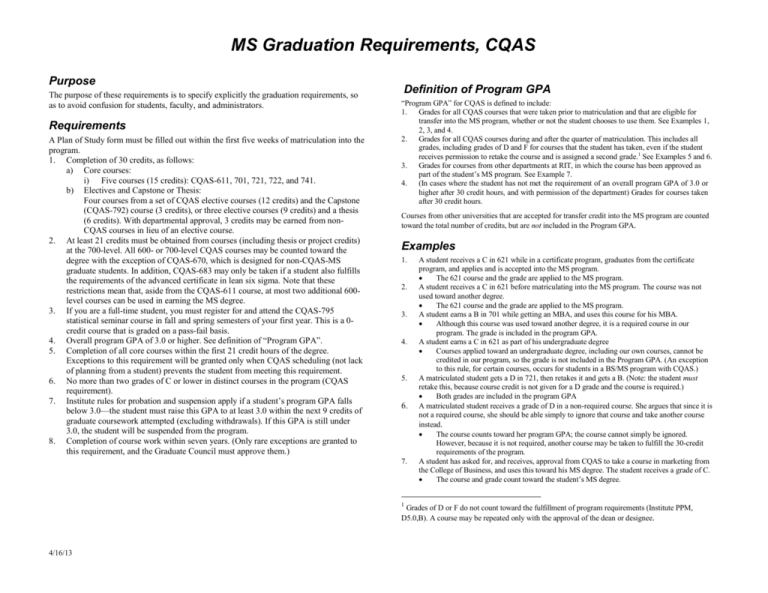
MS Graduation Requirements, CQAS Purpose The purpose of these requirements is to specify explicitly the graduation requirements, so as to avoid confusion for students, faculty, and administrators. Requirements A Plan of Study form must be filled out within the first five weeks of matriculation into the program. 1. Completion of 30 credits, as follows: a) Core courses: i) Five courses (15 credits): CQAS-611, 701, 721, 722, and 741. b) Electives and Capstone or Thesis: Four courses from a set of CQAS elective courses (12 credits) and the Capstone (CQAS-792) course (3 credits), or three elective courses (9 credits) and a thesis (6 credits). With departmental approval, 3 credits may be earned from nonCQAS courses in lieu of an elective course. 2. At least 21 credits must be obtained from courses (including thesis or project credits) at the 700-level. All 600- or 700-level CQAS courses may be counted toward the degree with the exception of CQAS-670, which is designed for non-CQAS-MS graduate students. In addition, CQAS-683 may only be taken if a student also fulfills the requirements of the advanced certificate in lean six sigma. Note that these restrictions mean that, aside from the CQAS-611 course, at most two additional 600level courses can be used in earning the MS degree. 3. If you are a full-time student, you must register for and attend the CQAS-795 statistical seminar course in fall and spring semesters of your first year. This is a 0credit course that is graded on a pass-fail basis. 4. Overall program GPA of 3.0 or higher. See definition of “Program GPA”. 5. Completion of all core courses within the first 21 credit hours of the degree. Exceptions to this requirement will be granted only when CQAS scheduling (not lack of planning from a student) prevents the student from meeting this requirement. 6. No more than two grades of C or lower in distinct courses in the program (CQAS requirement). 7. Institute rules for probation and suspension apply if a student’s program GPA falls below 3.0—the student must raise this GPA to at least 3.0 within the next 9 credits of graduate coursework attempted (excluding withdrawals). If this GPA is still under 3.0, the student will be suspended from the program. 8. Completion of course work within seven years. (Only rare exceptions are granted to this requirement, and the Graduate Council must approve them.) Definition of Program GPA “Program GPA” for CQAS is defined to include: 1. Grades for all CQAS courses that were taken prior to matriculation and that are eligible for transfer into the MS program, whether or not the student chooses to use them. See Examples 1, 2, 3, and 4. 2. Grades for all CQAS courses during and after the quarter of matriculation. This includes all grades, including grades of D and F for courses that the student has taken, even if the student receives permission to retake the course and is assigned a second grade.1 See Examples 5 and 6. 3. Grades for courses from other departments at RIT, in which the course has been approved as part of the student’s MS program. See Example 7. 4. (In cases where the student has not met the requirement of an overall program GPA of 3.0 or higher after 30 credit hours, and with permission of the department) Grades for courses taken after 30 credit hours. Courses from other universities that are accepted for transfer credit into the MS program are counted toward the total number of credits, but are not included in the Program GPA. Examples 1. 2. 3. 4. 5. 6. 7. 1 A student receives a C in 621 while in a certificate program, graduates from the certificate program, and applies and is accepted into the MS program. The 621 course and the grade are applied to the MS program. A student receives a C in 621 before matriculating into the MS program. The course was not used toward another degree. The 621 course and the grade are applied to the MS program. A student earns a B in 701 while getting an MBA, and uses this course for his MBA. Although this course was used toward another degree, it is a required course in our program. The grade is included in the program GPA. A student earns a C in 621 as part of his undergraduate degree Courses applied toward an undergraduate degree, including our own courses, cannot be credited in our program, so the grade is not included in the Program GPA. (An exception to this rule, for certain courses, occurs for students in a BS/MS program with CQAS.) A matriculated student gets a D in 721, then retakes it and gets a B. (Note: the student must retake this, because course credit is not given for a D grade and the course is required.) Both grades are included in the program GPA A matriculated student receives a grade of D in a non-required course. She argues that since it is not a required course, she should be able simply to ignore that course and take another course instead. The course counts toward her program GPA; the course cannot simply be ignored. However, because it is not required, another course may be taken to fulfill the 30-credit requirements of the program. A student has asked for, and receives, approval from CQAS to take a course in marketing from the College of Business, and uses this toward his MS degree. The student receives a grade of C. The course and grade count toward the student’s MS degree. Grades of D or F do not count toward the fulfillment of program requirements (Institute PPM, D5.0,B). A course may be repeated only with the approval of the dean or designee. 4/16/13

